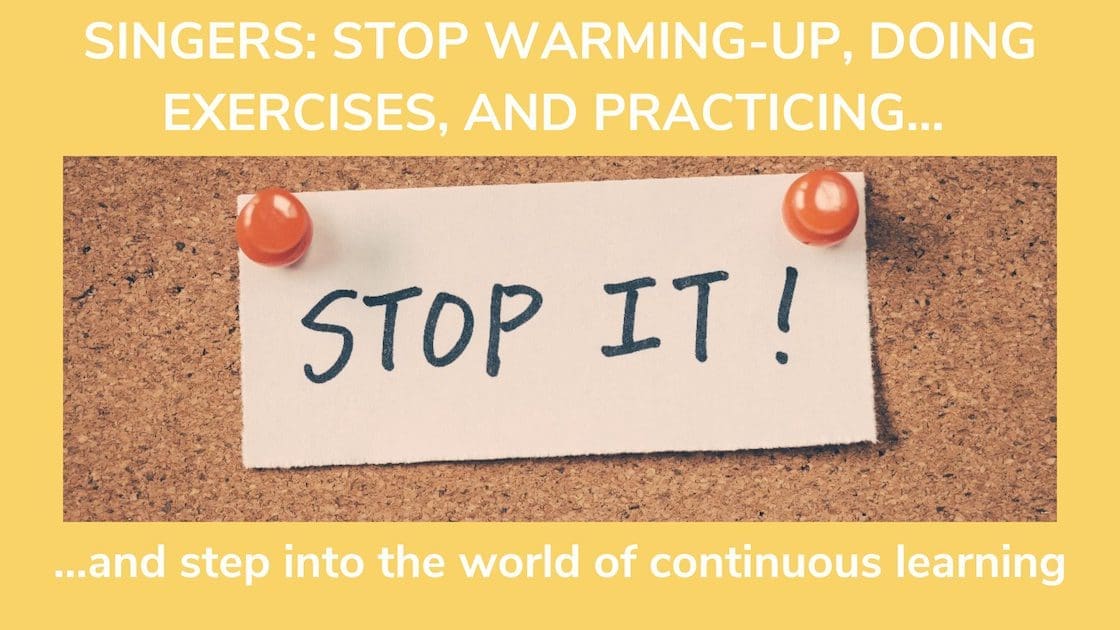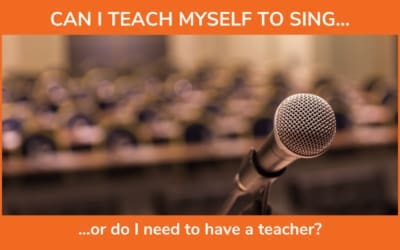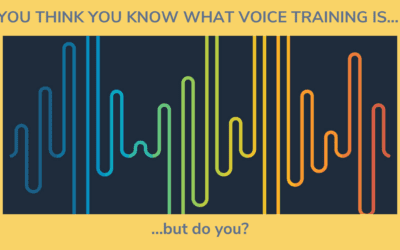I have earned a bit of a reputation in the voice world as the guy who says “don’t warm-up!” – thanks to that wonderful podcast I did years ago with the Naked Voice guys, Chris and Steve! (Have you figured out where your lips are yet, Chris?! 😉)
And, it’s still true, I don’t believe in warming-up! I also don’t believe in doing vocal exercises or practicing in the traditional manner.
And, you’re probably thinking: “What?!?! Don’t warm-up? Don’t do exercises to improve my technique? Don’t practice?!? What’s wrong with you?!?”
I know, I know… it sounds crazy! And, I totally understand why hearing has made so many of you angry. I get it.
But, really, I mean it… STOP IT! And here’s why…
Let’s face it, most of you singers out there do and have done all of these things – endless warm-up, exercises galore and practice, practice practice – religiously, and you still aren’t improving – not as much as you should have by now. Or at least you’ve plateaued at some point and/or have already started experiencing “diminishing returns” and those things that used to work just don’t work any more.
Have you ever thought that it could be the warming-up, exercises and practicing that could be the problem? Not you…
Have you ever thought about what would happen if you stopped?
Here’s a little background to help you wrap your body/mind/voice/self around these “crazy” ideas!
Warming up:
- What are you warming up? Muscles? Nerves? Memories? Unless you are in some extreme state of duress, experiencing deep dysfunction and/or having daily bouts of complete amnesia, why are you doing this so often?!? Is it necessary?!?
Would you stop and warm-up before needing to jump out of the way of a bus that was about to hit you? Would you stop and warm-up before kissing your beloved, before making love? Would you stop and warm-up before opening a jar from the cupboard? Do you warm-up your hands before singing your name on a document?
I hope not. If so, you’re either in big trouble neurophysiologically and/or so completely indoctrinated into the notion of warming-up that you can’t help but do it – in other words, it’s a compulsion. - Singing is not a fitness activity. Don’t get me wrong, muscles are great, and yes, muscles are involved and some extraordinary skill is involved and required, but singing is NOT a marathon or test of strength or endurance. It’s a game of skill and nuance, balance and coordination regardless of strength and training.
If you are coming to singing from some muscular/athletic paradigm, you are superimposing the rules of one game on top of a COMPLETELY DIFFERENT game! And, even if it works for a while, you’ll soon see that it inevitably reaches its limit of usefulness. - Warming-up also involves what I call “Negative Hypnosis.” If you think… “I cannot do y unless I do x first” then what you are really saying is, “I cannot do x.” If that’s about singing it could be, “I cannot sing unless I blow through a straw first” and/or “I cannot hit high notes unless I jump up and down 5 times first.”
This is negative conditioning. You are conditioning yourself not to be able to sing (and/or hit high notes) without performing some other steps beforehand. This is ludicrous. What if you need to sing now? Are you ready? Why not? What would it take for you to be almost always ready almost all of the time? Not warming-up, I’ll tell you that. If you keep warming-up that will insure that you are NEVER ready now or whenever you might need to be.
I was interviewed on this podcast episode from The Naked Vocalist podcast, where I delve into why warming up isn’t necessary and why really knowing yourself is HUGE! This episode is packed with quotes, book recommendations and gems for all teachers and singers to get hold of! You can listen to it right here:
Exercises:
- First of all, everything we do has an effect. Just because there’s an effect does not mean you’ve learned anything. If you keep going for the effect, you’re in essence chasing your voice, but never meeting it. What if you stop all the fixing and the chasing and let your voice be what it is, how it is, where it is, now and take it from there.
- What are exercises anyway? They are sequences of things to do with a specific known goal or outcome designed by some “expert” somewhere in order to “fix” a given problem that apparently you have.
This is like the idea of warming-up in many ways….How? The logic is similar. You are saying, “If I do this exercise then it will fix my voice in this way.” And, if it works, now you have to do it again and again to get that feeling back after the effect wears off. It’s just more conditioning. And, that’s not fixing anything. It’s just amassing lots of fancy bandaids to cover the fact that there’s a gaping wound hidden under the surface that you don’t want anyone (even yourself) to see is there.
And what’s that wound…? It’s not really a wound at all – though some would like you to believe it is some fatal flaw or deep lack of talent – it’s wherever your organic development left off (usually around 12 years old) and before you tried to “get good” at singing (or whatever it is you’re trying to get good at) by doing what you “should.” (Remember that old phrase… “I’m sick of being should upon!” Well… you should be! 😉) - So, is there really a problem? One of my personal and pedagogical aphorisms is: “There is no problem, nothing to fix, nothing to prove. There is only ever something to learn.” No, there’s no problem at all. There’s just a lack of learning and development. That’s it.
- Oh and another thing: If you already know what the exercise is supposed to do and you’re using it to make that thing happen, is it of any real value if and when it does?!? For me, learning involves discovery, surprise and functional updating without force, coercion and/or harassment! It involves development.
And, if it’s functional – a truly functional developmental process – it will just happen when you engage your system in genuine functional somatic systemic learning processes that update the system rather than endeavor to manage only the surface symptoms or clashes. Otherwise, it is like what is called having a “septic focus” – When I “fix” one problem, I’m creating another one and then I have to fix that one, which creates another and another and on and on until you hurt yourself or give up!
Think about it: Did you know you were going to “roll” the first time you fell to your side from your back as a young child? Did you know you would “stand” the first time you put weight on both feet and stretched your frame up into the air? Did you even know what “spelling” was the first time you recognized a letter and could write it? Did you know you were learning a language the first years of your life when you were communicating with the people around you?!? No… that all came later and was built on a developmental process of discovery and a seemingly infinite array of experiences, experiments and expansions of those skills.
Practicing:
- What is practicing? Most of us are trained to think that we have to practice a song to learn it and that means that we have to “get it right” as soon as possible (whatever that means?!) and then repeat the song – or parts of a song – over and over again until it’s perfect. Again, this is compulsive and the thinking behind it is, unsurprisingly, similar to warming-up and exercise work.
Let’s say you know the song (the lyrics, notes and rhythm). Why can’t you just sing it? Why is repeating it again and again going to improve how you sing it? Who says that the way you want it to be is the best/easiest/most functional it could be? And, if you’ve already “learned” it (aka memorized it), didn’t you already memorize it within the context of your current vocal abilities?
How is repeating it more and more times going to change that?!? I guess you could move to trying to “fix it” but… as I said above…
How?!? Fix what?!? Then what? Bandaids! OY! - Have you ever gone back to sing a song that you used to sing a LONG time ago and when you try to sing it again, it has ALL of your old bad habits learned into the song no matter how far you’ve progressed since then? EXACTLY!
By repeating and repeating it in order to “get it right” what you are really doing is ingraining all of your current limitations into the “framework” of that song (text, melody and rhythm.) It’s a losing battle. Like alcoholism. You’ll never “win against the bottle.” You have to surrender to who and what you really are right now and surrender to something greater than yourself, something greater than the bottle.
For some that’s GOD. In this case, vocally speaking, it’s your system (nervous system, brain, self, being, etc.). I’ll call it your system here. Your system is much greater than the conscious “you” that’s reading this right now and if you let your larger system “take the wheel” it has the power to ACTUALLY update itself in profound and lasting ways – ways that you will NEVER consciously control or even understand. And that’s wonderful! HALLELUIA!
As my friend and mentor, Richard Corbeil, says, “Your system is doing its best so that you can do your best.” Engage your system in learning – give it new information in a way that it understands – and you’ll never have to consciously sweat the small stuff again! It just happens. And if not, what is needed is not more warming-up, exercises or endless practicing… but more organic learning.
Ok. I could go on and on about each of these ideas, but that’s enough for now. Phew.
So, you might be asking yourself… ok, if all that is true, then what?!?
Well, you should always be skeptical and take your time with these things. This requires a real paradigm shift of thinking and being to really get it. Don’t force it. You can’t. And, don’t take my word for it, either. If it’s true enough (I say enough because the TRUTH is always beyond comprehension, but we can tap into it, nonetheless) it will be experienceable and you will see and know what I’m talking about, in your own way, in your own time. Or not. It’s up to you.
But, if this interests you…
Here are 5 things you can do, instead, that will have even better results:
1. Just sing!
It can be scary at first for some. It can also be profoundly liberating to just sing – no warming-up before, no regime of x, y and z to get you ready. You’re ready now. You are ready to do what you actually already know how to do. If when you just sing it is not what you want, wish or like then that’s just where you are at the moment, developmentally. If you could do more, you would. No manner of warming-up is going to change that – it might cover it up for a while, but that’s it.
For most people it just covers over their actual functional baseline so that when they do sing (post warming-up) what they are doing is an artificial and inaccurate sense of their actual current abilities.
When you “just sing” you get to see where you really are vocally, physically, developmentally, technically and personally. If you want to improve your singing from there in a way that updates your whole system and truly lasts it will require a totally different kind of process – one that compulsive “warming-up” and “pre-setting” and exercises will only slow down or, most tragically, prevent from ever occurring.
What to do instead…? Well…
2. Play!
Have fun, be silly, try new things, practice doing without knowing what you are doing or what you will do, let yourself be surprised. When something surprising happens, stay with it, explore it, see what it is, explore it. Do things you normally wouldn’t do, then return to the familiar. Go away, come back, go away a different way, come back again a new way.
If you don’t control the process and allow something new to happen, the familiar can change! It does change. The familiar can become strange. The familiar can transform. Enjoy this. Be aware of it while it’s happening without interrupting or trying to capture it or understand the “why?” of it all.
Experiment. While doing all of this, stay within the range of comfort and ease, listen to what feels good, back out if anything feels uncomfortable in ANY WAY. Don’t push it. You don’t have to go to extremes to experiment. Play with what’s easy first and the ease will expand. Make the simple FUN!
When you learn to learn in this way… development will occur, it’s inevitable. And, most likely when you leave it and then come back to the experiment next (or any other experiment), it will be there – where you left off or even better – and available if you want it, when you want it.
Why? Because this is how your system learns. When you truly learn something… it becomes a part of you, not something you need to fuss about or compulsively re-assemble or repeat until it’s ingrained. It’s there. Trust it. Trust your system. Trust your SELF!
3. Explore Variations and Variations of Variations…
While just singing and playing, experimenting and learning, it is very helpful to play with variations. Each time you do something or “repeat it,” repeat it a little differently each time. Add something, change something, shift something. When you do this, it always stays fresh and interesting for “you” and your system. And it keeps you from imprinting anything in any ONE way. There is no one way. I call this: “The way of no one way” – but not in a chaotic way, in an ordered-random kind of way (Complexity Theory and all…).
This will prepare you for live performance, too, so that you can be utterly spontaneous and responsive and surf from variation to variation to do what you want when you want to in order to express yourself or bring a song to life while staying functionally in control at the same time.
Having many ways to do the same thing is a fundamental key to having a truly functional, efficient and artistically exciting style of singing – regardless of genre!
4. Engage in Sensory Awareness on a regular basis
As I have talked about in other places and in many ways, ALL of the above works best when it is within the context of personal sensory awareness practice. What’s that? Interoception – the ability to sense your body, your self in space, your sensations big and small, the details of your inner goings-on.
Do a scan:
Notice your feet (don’t move them, just notice them”). Where are they? Which is heavier or lighter?
Notice your breathing. Don’t change it. How are you expanding and contracting as you breathe in and out, out and in? Where are you moving most or least as you breathe? What, if anything, are your shoulder blades doing as you breathe?
Notice the air coming into your airway and going out. What pathway is the air taking from outside yourself to into your lungs? Make a sound as you exhale. What sensations are you aware of? What vibrational patterns do you notice? Where, how…etc.?
This could go on and on. It’s just sensing. This is an AMAZING SKILL that allows for all of the rest of it – singing, playing, experimenting, learning – to be easy, integrated and fun! As Feldenkrais said, “When you know what you are doing, you can do what you want.”
5. Keep singing/learning, singing/learning, singing/learning…
Stick with it. If you keep engaging in regular singing, and playing, exploring variations and expanding awareness while doing so… you will LEARN! Your system will actually develop and update and keep developing and updating. That’s how it works. And, it’s endless. Improvement is endless. (Even the best can keep improving!)
And then, at some point, you will look back and say, “OMG, I wasted so much time on those warm-ups, exercises and practice sessions. What was I thinking?!?” It’s such a relief to stop trying to manipulate yourself (and allowing others to try to manipulate you) into being good, acceptable, successful and whatever else.It’s a farce, a painful farce.
So, as I like to say, “Stop singing and just SING!” In other words, “Stop trying to sing “well,” stop trying to fix this or that, stop trying to aim for x, y or z sound and let your voice emerge as it is now. Let your self emerge through your voice.” The rest will unfold, organically.
If you like the way this sounds and would like some guidance on how to make this shift for yourself, check out my online programs, THE SINGING SELF PROGRAM, and if you’re a voice teacher you can do both at the same time (update your own singing while learning to facilitate the genuine learning of others) in the TEACHER TRACK.
I’ve created both programs to facilitate learning and GUESS WHAT?!?! In all the recorded hours of the program there is NEVER one warm-up or exercise, and no need to practice ANYTHING. I facilitate your learning and deep systemic updating by creating many different situations in which you will sing, play, explore, be surprised, get confused (in a good way), find many variations and new possibilities, sing better and better and develop a deep and lasting sense of personal sensory awareness along the way. (That personal sensory awareness and all the experiences of learning become the basis of your somatic empathy and creative imagination as a voice learning facilitator, btw.)
I know, it’s paradoxical, someone else guies my organic personal learning process? But, it works! I’ve done the work for you in terms of creating the container for this kind of learning, all you need to do is show up and engage. Your wildly intelligent system takes care of the rest!





This theme!! This work is endlessly interesting and rewarding-